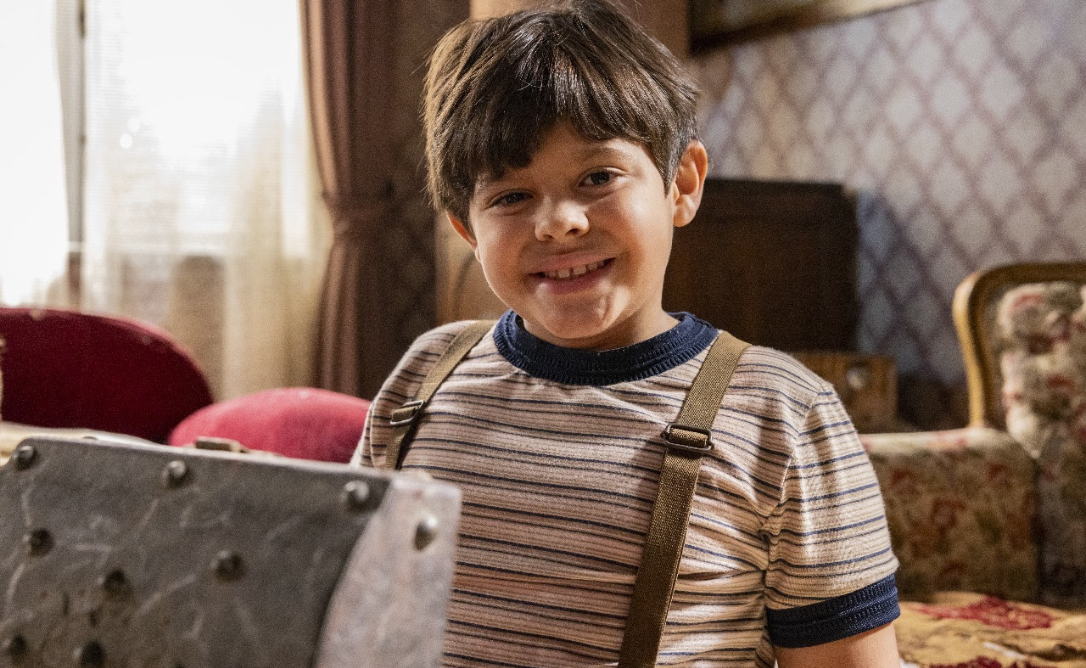Michelle and Melissa Macedo, twin sisters known for their alt-pop duo MACEDO, bring a disturbing narrative to life in Thinestra, a film set to premiere in June 2025 at the Raindance Film Festival in London. Directed by Nathan Hertz, the feature blends body horror with social critique as it explores the limits of obsession with appearance and the harm caused by unattainable beauty standards. In the story, Michelle plays Penny, who, in an attempt to alter her body using a mysterious drug, unleashes the creation of a cannibalistic double — Penelope, portrayed by Melissa. In addition to starring in the film, the sisters also created the soundtrack, intensifying the production’s dark and psychological atmosphere.
You portray two versions of the same character, Penny and Penelope, who represent opposite sides of a fragmented psyche. What was it like for you both to dive into such an intense and visceral duality together on set?
The whole shooting process was very intense. This topic is incredibly important to us, partly because, as twins, we’ve always had our bodies compared and we’ve always been in context of each other, so diving into characters that are literally two halves of the same person felt very cathartic. We were always there for each other’s scenes on set so we could support each other and get a fuller picture of Penny/Penelope’s arc. We also both worked with a movement coach to really find our synchronicity as a character.

The film tackles complex themes like obsession, self-image, and inner violence, especially within the context of beauty culture. How do you connect these deep discussions with your own experiences as women, queer artists, and mixed-race individuals?
These themes were very easy to connect with for us. The roles forced us to confront our own shame and all of the noise around body image and self-worth. In our experience of the world, there is a deep-rooted pressure to be what other people expect. In general, it’s easy to feel that navigating through the world would be easier if we were thin enough or enough of a certain race, gender or sexual orientation. We feel that maybe if we achieve the perfect version of us, we can finally be loved. I think that’s a universal feeling.

In Thinestra, the sisterhood between you is explored in a very unique and symbolic way. How did your real-life experience as twin sisters influence the development of this dynamic on screen?
Being twins gave a truly unique perspective on this role. We’ve always had this built-in connection—someone who gets you, challenges you, and has your back no matter what. But there’s also this cultural obsession with twins, like we’re one person split in two, like we owe people sameness. That tension—between deep intimacy and being constantly watched or compared—really informed how we played Penny and Penelope. It’s not just two characters; it’s one identity torn in half, and we know that dynamic firsthand.

The film’s soundtrack mixes classic Christmas tunes with a dark and distorted tone, bringing your musical signature into the body horror universe. What was it like to create and perform these songs within such a different context?
We had a great time warping holiday classics into something eerie and off-kilter. Christmas can feel magical, and also very dark, so we leaned into that tension.In our cover of “Jingle Bells” we call “Jingle Bells on the 101” we fell in love with our producers’ reimagining of the classic song. Our team at Jenga Productions really helped craft the entire vibe. We loved it so much we are releasing a Creepy Christmas EP! In our yet to be released version of Carol of the Bells, we split it into “above and below”, heaven and hell, and you can really feel that descent into darkness. Jenga Productions (Nicci Funicelli, Shayon Daniels and James Funicelli, as well as our brilliant composers Charlie Laffer and Tom Walley really brought the whole thing to life in every aspect of the score. Their ideas pushed the music into something truly unsettling and cinematic.

The film aims to provoke reflection on bodily autonomy and the beauty standards imposed by society. What do you hope the audience takes away after watching this disturbing yet deeply real story?
I think this movie is a perfect opportunity to challenge an idea that most people don’t think about much. We, as a culture, have a deep fascination with before and after, with transformation and comparison. The message is that you will finally be valued when you reach some “after”, no matter what you experience along the way. There is a nebulous expectation for women to be skinnier, hotter, younger and more desirable to men yet not vain or threatening to women. There is a finality, a place that represents the pinnacle of success. This film mirrors this idea to the audience. The desperation, the fight, the shame of not being the “after”, of never being the other, that no matter how hard you try you can never be someone else. Therefore, by using twins who are two completely different people, you are confronted with the fact that you can never be another person. This film confronts people’s value system of individualism and exploitation. Penny and Penelope are two different iterations of this system of exploitation. Penny is filled with shame about her body, feeling like she needs to hide from the world until she transforms. No matter how tortuous the process is, she’ll do anything to achieve it.
Thinestra has been compared to impactful works like Raw and The Babadook. Do you think that, through this project, you are opening new possibilities for telling queer and mixed-race stories in horror cinema? How would you like to see this representation expanded in the future?
We feel that when an actor can show up as themselves, whatever their identity, it always opens up future possibilities. It’s reductive when someone is pigeonholed and written based on just one identity as opposed to being a real, complex human being. We would love to see authentic human experiences of all kinds being accurately portrayed as opposed to being simplified.
Follow Melissa and Michelle Macedo on Instagram





